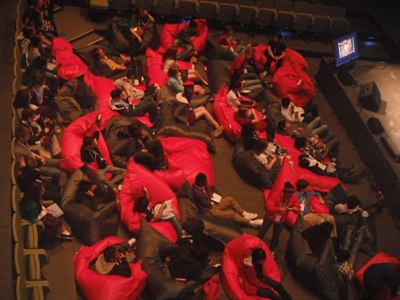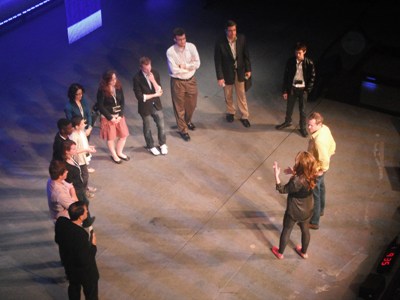
Although the theater is bursting with intelligence, bean-bags placed in the front of the stage add the perfect amount of comfort for the students to relax and take it what will be a mind-blowing day. Coordinators get the group riled up with a cheering challenge between middle and high school students. If you weren’t awake before then, the shouts of 200 plus kids were sure to do it.
As the audience waits for the show to begin, they are treated to video clips from past TED talks. Watching the footage really puts being at TEDxSMU into perspective. What is going to happen today is only the tip of the iceberg, making it that much more exciting.
The hosts for today’s talks are Rives and Kelly Stoezel. Rives, a riveting storyteller, and poet is a familiar face at TED events and on HBO’s Def Poetry Jam. Kelly, a Dallas native is the Content Director of big TED. So if you ever wondered where TED gets their amazing speakers, it’s all Kelly’s doing. Together Kelly and Rives hosted TEDActive in Palm Springs with unique workshops that cater to the senses
Elise Ballard
“Everyone is a genius, but if you judge a fish on its ability to climb a tree, it will spend its whole life believing its stupid.” – Albert Einstein
Our first speaker is Elise Ballard and she has the most appropriate topic to kick off TEDxKIDS. As an actress, filmmaker, and author, Elise was inspired by an epiphany at the age of 25. Her AHA moment allowed her to see not only the benefit but the value of a revelation. She took this thought and set out to find what other AHA-moments inspired others to escape into the pursuit of their dreams.
Diane Warren, an award-winning songwriter who has written for some of the nation’s biggest stars, is one of the people she found. At the age of 7, she realized that she was destined to be one of the biggest writers in the music agency. Even after rejections and letdowns, she kept moving forward and now people flock to work with her. The value of her epiphany has allowed her to inspire others to, “Believe in your passion, Believe in your power, Believe in being stubborn.”
Cory Booker’s story is one that some in the crowd could probably relate to. Booker wanted to be class president and he had to give the dreaded “Vote for Me” speech. It didn’t go as planned. He stumbled through the speech but he didn’t let it destroy his dream. Booker, now Mayor of Newark, New Jersey, realized his epiphany even in a moment of embarrassment and believes, “sometimes that dark moment you’re in is in the end actually a gift.”
After hearing stories like Diane and Cory’s, Elise stresses that the audience embraces their AHA moments. Being too scared to follow what you love could prevent your gifts from being shared to the world. Don’t be too scared to follow what you love. Just believe in your moments of revelation. Believe in what makes your heart sing. Believe in yourself, take action and watch the world conspire to support you.
“Become whistleblowers of peace.”
A former attendee of TEDxKIDS, Bo Hughes was inspired by last year’s talk on Falling Whistles. He took the ten-minute presentation and used it as a platform to launch it into an initiative of his own. Along with the help of his classmates at St. John’s Episcopal School in Dallas and the power of an epiphany, they began a fundraiser to support the organization.
The goal was to sell whistles – whistles much like the one’s children in the Congo used in wars that are supposed to save their lives. In reality, the whistles that these children blow lead to their deaths as they are used as human shields for the real soldiers. Bo and his classmates set out to raise $1,000 but it quickly became apparent that they can do much more. At the end of their campaign, they had raised $6,000 for Fallen Whistle and commemorated the event in a Fallen Whistle Ceremony. Their success was covered by the Dallas Morning News and they were asked to start the first middle school Falling Whistle Circle.
With an idea fueled by will, Bo was able to make something that was first thought inconceivable into a movement that gained recognition. Bo’s last thoughts are to encourage the audience never think an idea is too small – if you run with it you never know where it will take you.
Have you ever thought about where your water comes from? Jeff Fulgham does. He has researched the figures and by 2025, 4/5ths of the world won’t have access to clean water with 1.8 million children die from water-born diseases. The earth is in a global water crisis with 3% of the world’s water freshwater and 1% of that is readily available. That slim percentage is divided into 70% for irrigation, 20% for industry and 10% for human consumption. That’s not a lot of water to go around and we are consuming more of it each day. So where is all the water going?
It’s our everyday use. Laundry, cooking, watering our lawns, washing our cars and those 10-minute hot showers that actually use 50 gallons of water. The human body only needs 20 liters of water a day but America is the worst offenders of overusing water.
Fulgham says we need to take a serious look at our consumption levels. One of the challenges we have is poor infrastructure. Old and leaky pipes waste create inefficiency and it needs to be addressed. New technologies are available to help us reduce water usage in irrigation systems. Coca-cola has already taken action to decrease how much water they use to produce their popular beverages.
Not only do we need to be aware of how we use water, but we also need to find new sources. Thankfully, it’s already in the works with these three methods:
- Rainwater. The University of Texas at Dallas is capturing water off of the top of car garages and using it as a beneficial resource.
- Desalination. What was once a long and expensive process, technology has made more affordable by 80%.
- Reuse. New purifying techniques are being applied to clean up what we use and turn it back into what we need.
We might have a way to go before we’re all on the same track but Jeff believes that doing what’s right for the environment is also economically smart.
Dominic Jackson
“If at first, an idea is not absurd then it has no chance of survival” – Albert Einstein.
What is the power of an idea? It’s evident in nearly everything we see and do. But what is the power of an idea coming from kids? Dominic Jackson wondered the same thing. As a student at Skyline High School in Dallas, he knew that the dynamics of the educational system around him were shifting. As he advanced in grades each year, he noticed that 40% of his classmates weren’t joining him. He wanted to find out why so he tapped the resource that was most available to him – the student body.
Dominic wanted to know what ideas students had to improve their educational experience and how teachers could perpetuate growth opportunities. He didn’t have high expectations of what the results would be but once he sat down with the students he was blown away by their response. The students had genuine concerns about their wellbeing. A light went off in Dominic’s head and he discovered what he thinks is the missing piece in the generational gap. Dominic’s theory is that everyone has an idea to change the world but what they need is the opportunity to communicate those ideas.
In our current state, there is a 12-year gap from when people are taken seriously as contributors to society. Twelve years is a long time to wait to have solutions acknowledged and respected.
Dominic believes that if our ancestors destroyed and recreated this world based on the necessity of their time that we should be moving forward with the same conviction. As he moves across the stage, Dominic implores his generation to take advantage of their youth. Sometimes opportunities are given but we need to have the strength to make one – to believe. Dominic believes that revolution is on the rise and there will be strength in
Trigg’s TED talk walks us through this journey of following his passion. He starts with a thrilling magic show that has the crowd oohing, ahhing and wondering, “how did he do that?”
Trigg had his first magic show at the age of 4 years old. As soon as he could read and get a library card, he was renting books and absorbing as much as he could. His first trick was the magic ball…with his mom’s soup ladle. He didn’t have to rely on those cheesy tricks for long though. He practiced and perfected his craft – moving him to the center stage of the magic world. He has traveled around the world, winning awards and becoming the highest-scoring American magician at the World Magic Contest in Las Vegas. But like any true magician, he’s pushing himself even further by creating and testing new tricks. If he has the will, Trigg Watson certainly has the trick to make it all happen.
The TEDxSMU journey continues with more live-blog coverage!






